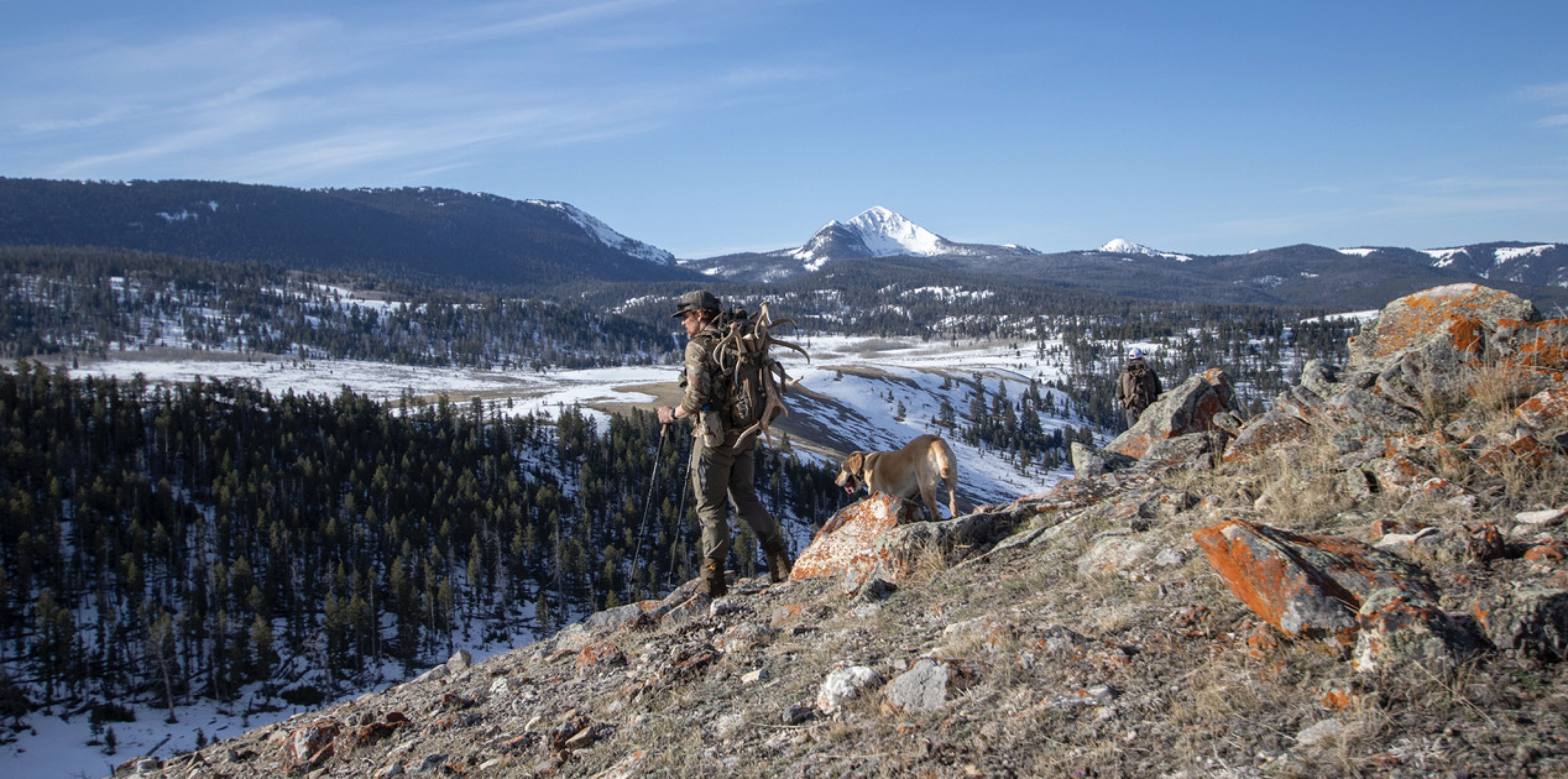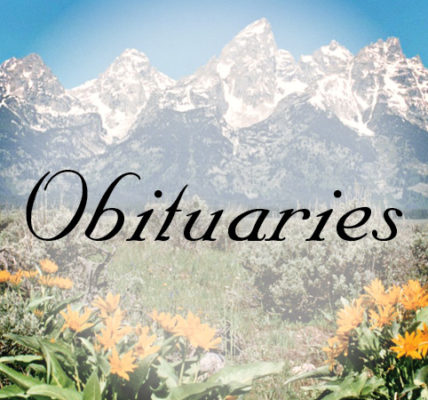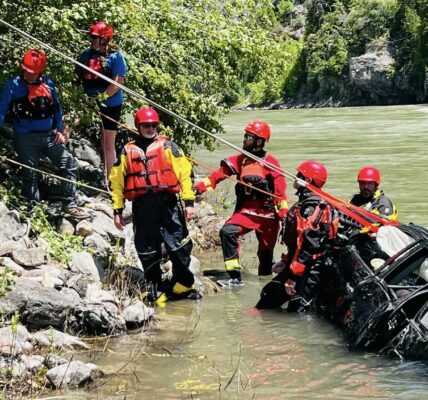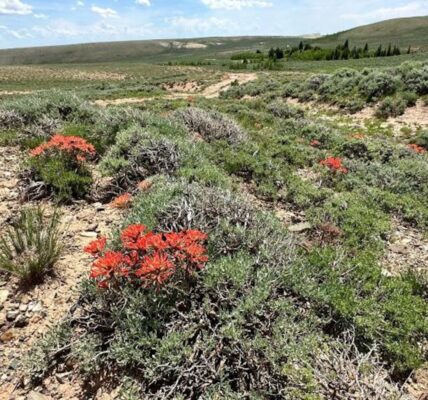
• Out-of-state sportspeople scramble to collect sheds before being cut out of future openers
By Billy Arnold
Jackson Hole News&Guide
Via- Wyoming News Exchange
JACKSON — Only a half hour after sunrise, and long before the sun’s rays hit the icy waters of Flat Creek, Jess Laughter paused, looking for a way to cross and get to the dead elk on the other side.
Then she realized another camouflage-clad antler hunter was behind her.
Laughter plunged full speed through the thigh-deep water, slipping on rocks but maintaining her momentum for the eight seconds it took her to cross. Once on the south bank, she threw up her arms and whooped. The hunter tailing her backed off.
Only 20 minutes had elapsed in her car-to-carcass quest for a deadhead, a skull from a bull that died before dropping its rack. Later, the 29-year-old Idaho Falls sportswoman agreed it was a fitting swan song.
“This was all I wanted,” Laughter said.
Next year, she and hundreds of other out-of-state antler hunters won’t be able to join Wyoming residents on the opening day of the Cowboy State’s shed hunting season.
That’s a major loss for Laughter and her husband, Steven, 32. They think the shed hunting east of the National Elk Refuge is some of the best in the West. While other members of the Jackson Elk Herd dine on refuge-provided alfalfa pellets throughout the winter, some large bull elk buck that trend, setting up shop in the Gros Ventre mountains’ foothills. There, they nibble grasses on wind-scoured ridges and sun-baked southern slopes, dropping their antlers as they do. Some, like the bull Laughter found, die before their racks fall off.
“Jackson has the potential to find giants,” Laughter said. “That’s the allure.”
But Wyoming legislators want to preserve that opportunity for Wyomingites.
This winter, they decided to change how openers have worked since 2009, when Wyoming first decided to regulate shed hunting west of the Continental Divide. The most controversial measure will give residents a one-week head start over nonresidents starting in 2024. Rep. Ryan Berger, R-Evanston, sponsored that bill for a number of reasons, like attempting to preserve quality shed hunting for Wyoming residents with disabilities.
But he said he pushed the measure with the entire Cowboy State in mind.
“There are perks to being a Wyoming resident,” he said.
Berger was born in Jackson and picked up antlers as a Boy Scout. But he doesn’t go out on opening day anymore.
“I just don’t want to be around that many people,” he said. “It gets pretty crazy.”
Antlers can fetch a hefty price, pushing $20 per pound. Dead heads are more valuable. But while the Laughters sell some of the antlers they find, they hunt for sport, not profit. They keep the dead heads.
They’ve also kept the friends they’ve met over the past six years that they’ve risen at the crack of dawn, piled into a pickup, and taken off on foot through the Bridger-Teton National Forest searching for ungulate remains. Almost every one of the six people that piled into their truck Monday morning were people they’d met at past openers.
“We always count on Jackson to reconvene us,” Laughter said. “I’ll miss the community.”
Open season
Mitch Furr’s day started early Monday.
While shed hunting wasn’t allowed until 6 a.m. May 1 in Teton County — the same time the Bridger-Teton lifted winter wildlife closures east of the refuge — the Caribou-Targhee National Forest opened some land in east Idaho at midnight. Furr, 31, and his brother, Miles Furr, 35, blasted through that area in the dark, grabbed some antlers and deadheads, then drove over Teton Pass, dropped their cache at the Cowboy Village Resort, where they were staying, and met the Laughters on Snow King Avenue.
The Laughters were in the first 50 cars in the lineup the Jackson Police Department queues annually at the Teton County Fairgrounds. The Furr vehicle was closer to the front.
But around 5:45 a.m., 15 minutes earlier than expected, the convoy started moving while Furr and his brother were back talking to the Laughters. They sprinted toward the front of line, but their friends were already driving. They weren’t able to catch up. Running along Snow King Avenue, Furr quickly called Steven Laughter and asked to hitch a ride. Laughter brake checked for a second, and the Furrs launched themselves into the bed of the truck. The next people in line yelled and honked. But Furr didn’t care.
As a nonresident, it was the last time he’d be able to participate in the Jackson shed opener.
“I was going to take any chance rather than watching the motorcade ride off into the dust and slump down in defeat,” Furr said.
The caravan sped off. But the procession wasn’t as clean as the lineup the night before. Drivers tried to pass the Laughters, and others who weren’t in the queue tried to sneak in. On the refuge road, the convoy kicked up a cloud of dust. The Furrs were piled in the back of the Laughters’ pickup with three dogs, another shed hunter and two reporters. There were five people in the cab and hundreds of people farther back in the lineup.
All told, about 200 cars made it into the caravan headed for the refuge. Refuge Manager Frank Durbian said he counted 198 cars in the procession, 117 that went up Flat Creek Road and 81 that went up Curtis Canyon Road. Jeromie Traphagan, the sergeant coordinating the police department’s lineup, said about 186 total cars officially joined the queue. The vast majority of those vehicles were from out of state: 55 from Idaho, 43 from Montana, 34 from Wyoming, and 20 from Utah. The balance were from elsewhere.
Managers had wondered whether more people would show up because of shed hunting closures farther south and it being the final year for nonresidents to join the May 1 fracas.
But they said it’s difficult to know how many people actually were there.
Though the refuge typically estimates three to four people, on average, occupy each vehicle that crosses its gates on opening day, hunters had packed almost every truck bed.
At the Flat Creek trailhead those hunters flooded out beyond the refuge like they usually do.
As the Laughters skidded to a halt on the road shoulder, the hunters in the trunk started moving seconds before the car stopped, throwing open the tailgate, opening dog crates, grabbing packs and tossing themselves over the sides. Jess Laughter yanked open the door, made eye contact with a News&Guide photographer to confirm he was tailing her and sprinted up the creek. The Furrs and Steven Laughter split south, splashing through the creek with a squad of other hunters reminiscent of a messily advancing infantry line.
Hours later, Arlis Hanson, a 19-year-old visiting from Saskatchewan, Canada, was covered in blood on an embankment above the creek, happily processing a dead head he’d found by Flat Creek. Removing a chunk of the skull with antlers still attached so he could easily transport it out of the field — a practice known as “skull capping” — Hanson said he’d gotten three hours of sleep the night before, and had come to Jackson primarily for the shed hunt. The young rancher wanted to see Wyoming’s backcountry. And the people.
“It sounded pretty Western,” Hanson said.
The morning was exactly what he wanted.
“Organized chaos,” Hanson said. “I was running on foot, racing as fast as I can and the horses were just flying past me, man.”
But he didn’t realize it was the last day he’d be able to participate in the fracas until a News&Guide reporter told him.
“This is my last chance?” he said, sawing into the bull’s skull with a Leatherman tool. “I’ll tell my grandkids about this one.”
Reining things in
Legislators, however, aren’t as impressed by what Hanson called the “intense craziness.”
When this winter’s legislative session started, Speaker of the House Albert Sommers encouraged freshman lawmakers like Berger to sponsor a bill.
As a special education teacher, Berger knew young men and women with disabilities who hunted sheds with their families.
“But they weren’t having many opportunities,” Berger said.
So he proposed a bill that would have given disabled people a few days’ head start. But after speaking with Sommers he broadened the bill to differentiate between residents and nonresidents. Originally, Berger proposed giving residents a three-day head start. But Sen. Larry Hicks, R-Baggs, amended it to seven, hoping to ensure that, wherever May 1 fell, Wyoming families would be able to spend a weekend in the hills before out-of-state shed hunters descended on winter ranges.
“It’s so tied to family,” Berger said, recalling packing a lunch with his parents to hunt sheds around Jackson as a kid. “Wyoming residents are wanting to get back to that family event where they’re not pressured and can find some sheds.”
But Berger and other legislators also want to reduce pressure on Wyoming’s wild inhabitants, which the state manages. This year the Wyoming Game and Fish Commission split the start of the shed opener, only allowing people to pick up antlers on May 1 in Teton County. Other shed hunt seasons south of Hoback and west of the continental divide won’t start until May 15. The goal was to give mule deep and pronghorn waylaid by a devastating winter time on their winter ranges without human interference.
Berger thinks going to a resident-only shed season start will generally dial back human impacts on wildlife, Wyoming’s “most prized possession.”
Gov. Mark Gordon ultimately signed two bills that will change shed hunting regulations for nonresidents. Berger’s will give residents a weeklong head start. The other will require nonresidents to purchase a $21.50 conservation stamp to hunt antlers, and declares antlers state property.
The bill delaying the start of the nonresident shed season eked by in the Senate with only one vote to spare. It passed 16-15 in that chamber.
What that measure will look like in practice remains to be seen. The Wyoming Game and Fish Commission is now required to promulgate rules for 2024. Having just set hunting seasons, it hasn’t released a proposal.
The second bill passed the Wyoming Senate and House of Representatives with relatively healthy margins.
During the session Rick King, the Game and Fish’s chief game warden, told legislators that enforcing the split between residents and nonresidents not be “impossible but certainly difficult.” Game and Fish is already dealing with a shortage of game wardens.
King pointed to years like 2020, when the difference between a midnight end of forest wildlife closures and a noon shed season start led to fistfights on the Bridger-Teton and over 100 calls reporting illegal pickups.
“I think the new differentiation between residents and nonresidents could cause a similar situation,” King said in January.
Wildlife managers later changed the start of the antler hunting season — and the end of wildlife closures — to 6 a.m. on May 1.
Sen. Mike Gierau, of Jackson, voted against Berger’s bill, reacting to conversations he recounted with counterparts in Game and Fish and U.S. Fish and Wildlife Service, which manages the refuge. He did not say who his sources were.
“It’s not that I was against locals getting a break,” Gierau said. “I was just hearing that it was going to cause more problems than it solves.”
Berger acknowledged that enforcement was a concern.
But, he said, it will be up to shed hunters to call in violations. That’s something that hunters targeting live animals like deer, elk and pronghorn already do.
“We do that as sportsmen in the field,” Berger said. “There’ll be lots of calls.”
Is there another way?
Four hours after sprinting into the hills, Steven Laughter trekked out of the Flat Creek drainage with five or six spikes, raghorns and larger antlers strapped to his pack. He said he was disappointed in the Wyoming Legislature, calling the bill “government overreach.”
“You can’t legislate your way into a shed hunt,” he said.
The majority of shed hunters who spoke with the News&Guide after emerging from the hills said they felt the legislation was wrongheaded. Among other things, they felt a one-week delay for nonresidents all but eliminates the opportunity they have now. Berger said that’s not true and that he finds sheds all summer while scoping hunting haunts. But, ogling over other hunters’ collections Monday, the Laughters and their friends said most antlers in the hills are collected in the first two hours of the opener.
“That’s why we wouldn’t come back,” said Jess Laughter, sitting on the tailgate of her truck.
But sportspeople weren’t a monolith.
Callie Ward, 55, drove up for the shed opener from Cotopaxi, Colorado.
She was there with a friend who was bucked from her horse at the start of the 2021 opener, hospitalized, and seeking redemption.
Ward wasn’t bothered by legislators’ decision.
“It’s their right,” she said. “It’s their state.”
“I didn’t come looking at this to make money,” Ward said. “It was just an experience. So I’m grateful that I got to do it before it was closed.”
People like the Laughters who oppose the change question the state’s decision to label antlers as its property.
They also don’t agree with the premise of protecting shed hunting quality for Wyomingites when the elk that drop them primarily winter on federal land, like the refuge and the Bridger-Teton.
Steven Laughter thought there were better ways to achieve the state’s goal, like establishing quotas for antler hunting, saving the majority of tags for residents and a minority for others.
“I’d be OK with not being able to come to Jackson every single year,” Laughter said. “Just as long as there’s still the opportunity.”
Laughter and Furr also feel Wyoming’s move could cause other states to bar nonresidents from participating in their shed openers. Laughter thought that would be a bad thing, turning into a state-to-state “pissing match” that puts out rank-and-file sportspeople.
Furr felt differently.
As a former wildlife biologist who currently works for the Virginia Department of Wildlife Resources, he understands states attempting to protect their own resources. But he said it would be important for other states in the area to follow suit.
“If other states that border these states don’t get on board with making similar laws, you protect one state’s wildlife while risking the others,” Furr said.
Furr thinks the only thing that would substantially reduce the pressure on shed hunting grounds would be banning the sale of antlers outright.
Brady Rivenes, 23, of Gillette, supports the legislature’s move. But he agreed with Furr.
“If these horns were worth a buck apiece, and then they changed the rule to allow anyone in the world to come again, I bet there’d be a third of the people here,” Brady Rivenes said.
Rivenes was hanging out with his friend Matthew Stone, 26, an Alaska resident, and two other people from Gillette: his dad, Gary Rivenes, 53, and Greg Mager, 52. Their party was split generationally. The younger Rivenes and his friend Stone, who won’t be able to participate in the opener next year, thought it was the right move. They were tired of the competition. But Rivenes and Mager said shed hunting wasn’t about the haul. For the older men, it was about the experience, spending time in the outdoors with friends and family.
Mager, in particular, said he liked having conversations with people from all over the county. The elder Rivenes said Wyoming would ultimately lose out by keeping nonresidents out of future shed openers.
“This thing here is forever changed,” Rivenes said.





